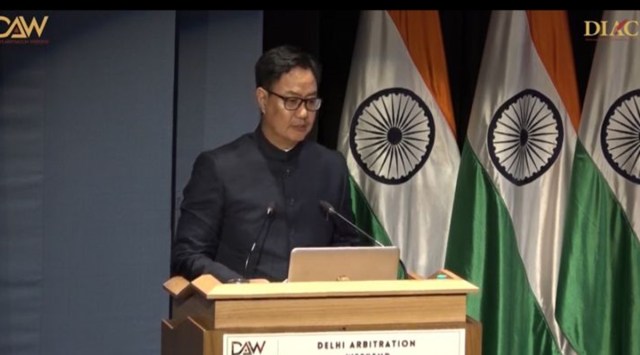‘India’s moment is now’: Kiren Rijiju assures government’s support to deliberations at the three-day Delhi Arbitration Weekend
Rijiju, who was the chief guest of the session, assured that “when courts initiate certain actions, the support from the government is expected.”
 Rijiju emphasised the need for institutional arbitration to enhance the ease of doing business and spoke on the government’s action of setting up the Arbitration Council of India.
Rijiju emphasised the need for institutional arbitration to enhance the ease of doing business and spoke on the government’s action of setting up the Arbitration Council of India. While addressing the concluding session of the Delhi Arbitration Weekend (DAW) organised by the Delhi International Arbitration Centre Sunday, Union Law Minister Kiren Rijiju extended the government’s support to the recommendations from the three-day event, calling them “path-breaking”.
Rijiju, who was the chief guest of the session, assured that “when courts initiate certain actions, the support from the government is expected.”
“I feel so privileged to be part of an event which is court-driven. It is my duty to ensure that whatever comes out of all the recommendations of this three-day intensive event, the government has to support it. It is not just coming out of the blue. It is coming out of deliberations and research. The whole global world of arbitration is looking at India because of this initiative,” Rijiju said.
Rijiju emphasised the need for institutional arbitration to enhance the ease of doing business and spoke on the government’s action of setting up the Arbitration Council of India, which is expected to incentivise arbitral institutions to improve their functioning and to bring uniformity of norms by framing policies and holding training as well as workshops.
“Considering the vastness of the country, even if a fraction of total litigation in the country is resolved through arbitration the potential for setting up arbitration institutions like DIAC and India International Arbitration Centre is huge, this… in my view is key for making India a hub… for arbitration,” Rijiju said, adding that arbitration should be encouraged for smaller disputes as well where one of the parties is a medium or small enterprise. He said the intention of the government is very clear, “Indian Courts must go paperless.” Rijiju then referred to the Rs 7,000 crore allocation in the budget to the e-courts project for achieving this goal.
He said that it’s “India’s moment now.” He asserted that the country’s geographical location is “very attractive” and with English being the common language of all courts, there is nothing that can stop the country from being a hub of international arbitration. He, however, suggested that law colleges and universities must promote the specialised study of ADR mechanisms so that the requisite exposure to the field is available to law students when they enter the profession. He also said that while India has many arbitration centres, there should be no conflict of interest among the centres, further laying stress on the need to set up more “arbitration centres in non-metro centres”.
The event saw participation from various International arbitration institutions and key representatives of top international and Indian law firms specialising in the field of dispute resolution. Rijiju thanked foreign participants and said that the “support from our friends will become an important factor for making India into a hub of global arbitration.”
Justice Sanjay Kishan Kaul, a Supreme Court judge, who was the guest of honour at the session, spoke about the Indian civilisation encouraging settlement of disputes through arbitration by means of panchayats. He said that courts have taken a pro-enforcement stance and added, “Parties must learn how to accept awards… unfortunately the public sectors more so require this as there is no point in carrying a battle through 2 or 3 tier scrutiny, just to complete a formality. I am sure the law minister will look into how it can be attended to.”
On virtual hearings, Kaul said that virtual hearings are now becoming a preferred mode in arbitrations as well. “Virtual hearing is consistent with adopting the ever-evolving needs of the virtual world and there is no need to spend money on travelling to different parts of the world to attend conferences… etc and some institutions also have virtual arbitration rules,” Kaul said.
He, however, noted that parties can insist on a physical hearing to delay the process and the arbitral tribunal has to take due steps to not let this happen. Kaul emphasized the need for arbitrators to be well-versed in the basics of technology. He said that another by-product of the virtual mode is the diversity in arbitrators which will result in having more “geographical flexibility in appointments” including the appointment of more women. Kaul signed off by stating that a diverse “arbitral tribunal leads to a better-moulded award”.







